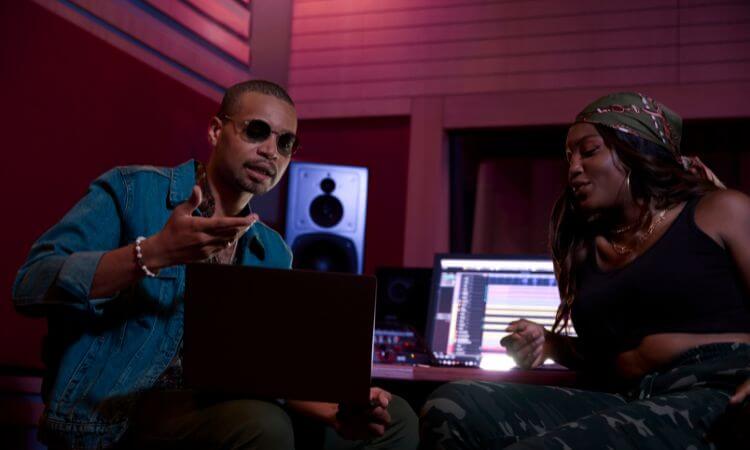
Music is a universal language that has been a part of human culture for thousands of years. It is an artistic expression that combines sounds, rhythms, melodies, and harmonies to evoke emotions and spread messages in the most wonderful aesthetic experience.
Everyone likes listening to music and amusing themselves, but it is a different ball game to be a musician. For a musician, one has to create music considering the availability of resources, the audience’s taste, and other important factors before deciding to create the music.
This article will explain the path to becoming a pro music creator. Read the article through the end to know the basics of creating effective music like a pro.
Elements of Music
Before we move on to the process of producing the music like an expert, let’s have some basic knowledge about the primary elements of the music.
Melody: A sequence of single notes to create a memorable and recognizable musical line.
Harmony: The combination of sounds or chords that support the melody.
Rhythm: The beats, patterns, and accents that give the music its pulse and groove.
Tempo: Tempo is the music performance speed, ranging from slow (adagio) to fast (presto).
Dynamics: The ups and downs in volume and intensity, from soft (piano) to loud (forte).
Timbre: The musical sound’s outstanding tonal quality or color, which differentiates instruments or voices.
The Art of Producing Music Like A Pro
Producing music like a pro needs several key steps and considerations. Here is a general guide to help you start the process:
Define Your Musical Vision
You must have a sound knowledge of the basic elements of the music before you go on to start creating. These elements include the genre, style, and mood you want to achieve. This will help improve your decisions throughout the process.
Set up Your Recording Environment
A pro musician should produce a comfortable and acoustically-treated space for recording. In addition to that, Investment in quality studio monitors, headphones, and microphones is a must. Ensure your recording equipment and software are ready to go.
Pre-production
A professional musician should Spend time on pre-production tasks such as writing and arranging the songs, creating chord progressions, and developing melodies. This stage is crucial for putting up a strong foundation for your music.
Recording
As a musician, you should focus on capturing high-quality recordings of your instruments and vocals. Another important aspect is paying attention to microphone placement and levels to ensure you capture clean and accurate audio. One should experiment with different microphone techniques to achieve desired tones.
Editing
Use a digital audio workstation (DAW) for editing and arranging your recorded tracks. Trim, align, and clean up your recordings. Quantize and screw up any loose timing. You can also use editing tools to eliminate unwanted noise or improve overall sound quality.

Mixing
Mixing is concerned with balancing and enhancing the individual tracks in your song. A musician should also get used to adjusting levels, pan instruments across the stereo field, applying EQ (equalization) to shape frequencies, adding effects like reverb and delay, and using compression to control dynamics. Moreover, achieving a balanced and coherent mix is also crucial.
Mastering
Mastering is the stage at which you polish and finalize your mix. Musicians also use mastering plugins or work with a professional mastering engineer to ensure their music sounds cohesive and translates well across multiple playback systems. Moreover, it is also crucial to apply EQ, compression, stereo enhancement, and limiting to achieve a professional, commercially competitive sound.
Attention to detail
Attention to detail is the most important stage of any task. Pay attention to minute details that can create a big difference, such as using automation to integrate movement and dynamics into your mix, using tasteful effects to increase the overall sound, and ensuring consistent volume levels throughout your tracks.
Continual learning and practice
Producing music like a pro is ongoing. Continually educate yourself on the latest techniques, experiment with new sounds, and practice your skills regularly. Learn from professional producers, study their work, and analyze their strategies.
Collaboration
For any working group, collaboration is the most crucial thing, and collaborating with other musicians, producers, or engineers is key if you are going to create music. Working with others is an opportunity to explore fresh perspectives and help you grow as a producer.
Conclusion
Becoming a pro producer takes time and dedication.
Being patient, persevering, and enjoying the creative process is also important. Moreover, focusing on the learning process using primary skills is the basic element of growth.










![Wong Diane – Now Only Me (Single Review) Wong Diane Now Only Me [Single Review]](https://musicreviewworld.com/wp-content/uploads/2023/08/Wong-Diane-Now-Only-Me-Single-Review-1-356x220.png)



